-
 Draper dumped out of Monte Carlo Masters by Davidovich Fokina
Draper dumped out of Monte Carlo Masters by Davidovich Fokina
-
Scheffler, McIlroy seek fast start as 89th Masters tees off

-
 EU halts counter-tariffs but no pause in US-China trade war
EU halts counter-tariffs but no pause in US-China trade war
-
Australian schoolboy Gout Gout runs sub-10 second 100m --- twice

-
 Scarlett Johansson to star at Cannes as festival unveils line-up
Scarlett Johansson to star at Cannes as festival unveils line-up
-
Stock markets soar as Trump delays painful tariffs

-
 Trump tariffs weigh on Germany as institutes cut forecasts
Trump tariffs weigh on Germany as institutes cut forecasts
-
US and Russia exchange prisoners

-
 Japan top yakuza group promises 'no more trouble'
Japan top yakuza group promises 'no more trouble'
-
Champion Martin eyes Qatar return as 'bitter' Marc Marquez seeks redemption

-
 The US citizens still held in Russian prisons
The US citizens still held in Russian prisons
-
US-Russian ballet dancer Ksenia Karelina freed by Moscow: Rubio

-
 Not just penguins on Antarctic islands hit by Trump tariffs
Not just penguins on Antarctic islands hit by Trump tariffs
-
Canada PM says Trump's pause on tariffs a 'welcome reprieve'
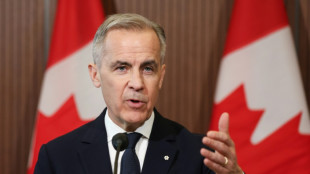
-
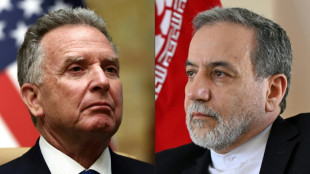 Witkoff and Araghchi: the men leading US-Iran nuclear talks
Witkoff and Araghchi: the men leading US-Iran nuclear talks
-
Stocks zoom higher as Trump delays painful tariffs

-
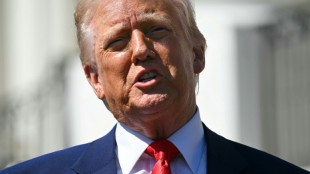 China urges US to meet 'halfway' as markets rocket on Trump tariff pause
China urges US to meet 'halfway' as markets rocket on Trump tariff pause
-
Vatican releases image of Charles, Camilla meeting pope
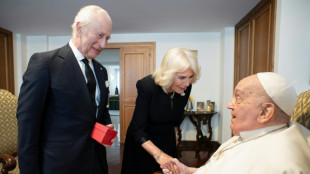
-
 Waratahs' McKellar rules out becoming next Wallabies coach
Waratahs' McKellar rules out becoming next Wallabies coach
-
Taiwan's TSMC says first quarter revenue up 42 percent

-
 Rybakina leads Kazakhstan to BJK Cup victory over Australia
Rybakina leads Kazakhstan to BJK Cup victory over Australia
-
Vietnam says it will start trade talks with United States

-
 Expo 2025 in Japan: five things to know
Expo 2025 in Japan: five things to know
-
Japan's World Expo touts unity, and algae, in turbulent times

-
 Trump's tariff pause gives market relief, but China trade war intensifies
Trump's tariff pause gives market relief, but China trade war intensifies
-
Papua New Guinea lifts ban on forest carbon credits

-
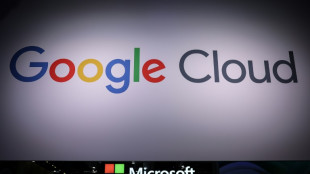 AI surge to double data centre electricity demand by 2030: IEA
AI surge to double data centre electricity demand by 2030: IEA
-
Scheffler, McIlroy seek fast start in hunt for history at Masters

-
 Samsung under pressure as US tariffs rattle South Korean economy
Samsung under pressure as US tariffs rattle South Korean economy
-
Munster wary of 'chaotic' Bordeaux-Begles in Champions Cup quarter-final

-
 Ranieri eyeing Champions League for Roma before derby swansong
Ranieri eyeing Champions League for Roma before derby swansong
-
Verstappen out to silence McLaren in the battle of Bahrain

-
 Asian stocks crack higher as Trump delays painful tariffs
Asian stocks crack higher as Trump delays painful tariffs
-
Cannes to unveil film selection under pressure over industry abuse

-
 Messi scores twice in Miami's frantic comeback over LAFC
Messi scores twice in Miami's frantic comeback over LAFC
-
Swimmers get medal boost with new events added for 2028 Olympics

-
 Companies keen to start deep-sea mining off Norway
Companies keen to start deep-sea mining off Norway
-
US House votes to limit judges' injunction power
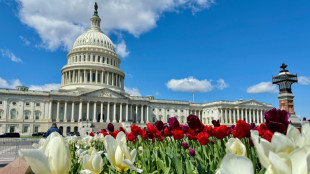
-
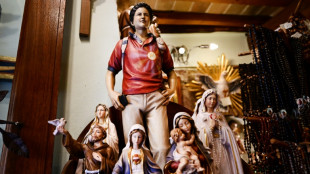 Pilgrims in Italy flock to tomb of first millennial saint
Pilgrims in Italy flock to tomb of first millennial saint
-
China consumer prices slump for second straight month: data

-
 Tearful Doncic scores 45 on return to Dallas as Lakers clinch playoff spot
Tearful Doncic scores 45 on return to Dallas as Lakers clinch playoff spot
-
Hamas leadership operating behind veil of secrecy

-
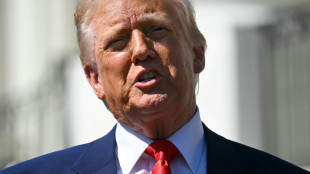 Trump stuns with tariff backtrack but hikes China rate to 125%
Trump stuns with tariff backtrack but hikes China rate to 125%
-
Messi scores twice in Miami's three goal comeback over LAFC
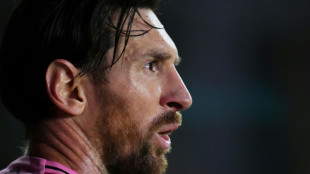
-
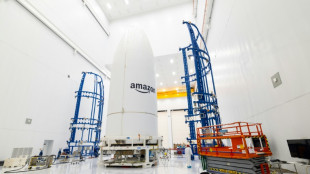 Amazon satellite launch scrubbed due to weather
Amazon satellite launch scrubbed due to weather
-
Art of the deal? How Trump backed down on tariffs
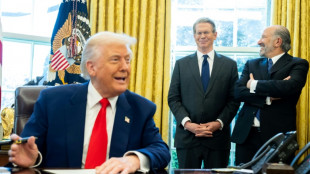
-
 Icotrokinra Results Show 75% of Adolescents with Plaque Psoriasis Achieved Completely Clear Skin and Demonstrate Favorable Safety Profile with a Once Daily Pill
Icotrokinra Results Show 75% of Adolescents with Plaque Psoriasis Achieved Completely Clear Skin and Demonstrate Favorable Safety Profile with a Once Daily Pill
-
Verde(R) Announces New Biobased, Biodegradable PolyEarthylene(R) Film Grades

-
 Berkeley SkyDeck Demo Day to Showcase Unprecedented Momentum in AI
Berkeley SkyDeck Demo Day to Showcase Unprecedented Momentum in AI
-
Classover to Hire 2,500 U.S. Teachers to Power Operations and Curate Proprietary AI Training Dataset

US Federal Reserve with “announcement”
In a widely-followed press conference, the US Federal Reserve (Fed) announced a significant economic contraction in order to control the growing risk of inflation in the United States. With this decision, the central bank is reacting to persistently high rates of inflation and a rapidly changing economic situation. At the same time, the measure sends a signal to companies and financial markets: after a phase of historically low interest rates and extremely loose monetary policy, the course could now change in the direction of a more restrictive phase.
Rising interest rates and tighter monetary policy:
Contrary to the course of recent years, when the Federal Reserve supported the economy with low interest rates, the focus is now on interest rate hikes and a reduction in the Fed's balance sheet. This is intended to dampen excessive demand, slow credit growth and contain inflation. Fed Chairman Jerome Powell emphasized that these steps are necessary to ensure sustainable and stable economic development over the medium term.
Market analysts see the announced contraction as a significant policy shift. Many investors had already expected interest rate hikes, but the clear focus on a restrictive policy exceeded the expectations of some observers. As a result, stock markets came under short-term pressure and the US dollar depreciated slightly against other leading currencies.
Background: Inflation and economic uncertainties:
The rate of inflation in the US has reached record levels in recent months. Supply bottlenecks, rising energy prices and high consumer demand had noticeably driven up prices. In addition, numerous economic stimulus packages initiated in response to the coronavirus crisis have stabilized the economy, but have also led to a high amount of money in circulation.
With the announcement of an economic contraction, the Fed is seeking a balance: on the one hand, price stability and a reduction in speculative bubbles should be ensured, while on the other hand, the Fed wants to avoid an excessive cooling of the economy. Jerome Powell emphasized that developments are being monitored closely and that the Fed is prepared to take action if necessary.
Impact on companies and consumers:
A more restrictive monetary policy primarily affects companies that have relied on cheap credit. For firms that finance growth through debt, costs could now rise, which could slow investment and expansion in some sectors.
Consumers are also likely to feel the effects of rising interest rates, especially real estate buyers and credit card customers. Higher mortgage rates could put the brakes on the residential real estate market and make buying a home more expensive.
At the same time, however, there are also positive aspects: an effective fight against inflation preserves the purchasing power of the population and can reduce speculation risks. In particular, people with savings could benefit from higher interest rates, provided that financial institutions adjust their rates.
Criticism and outlook:
Not all experts consider the Federal Reserve's move to be appropriate. Some critics warn that curbing growth too quickly could jeopardize new jobs and slow down the economic recovery after the pandemic. The fear is that if the US economy cools more sharply than expected, the labor market could deteriorate again and high inflation could only moderate moderately.
Nevertheless, many experts see the decision as overdue. In view of record inflation and a stock market environment that is overheated in some areas, there is a need for action to stabilize the fundamental data again. The coming months will show whether the US economy can strike a balance between stabilizing and avoiding a recession – or whether a more severe downturn is looming.
Conclusion:
The Federal Reserve has sent a clear signal to markets and consumers with its announcement of an economic contraction. Higher key interest rates and a tighter monetary policy should curb the record inflation and enable a more balanced economy. At the same time, there are risks for growth and the labor market if the economic environment deteriorates more quickly than expected. It remains to be seen whether this balancing act will be successful, but it is clear that the latest step marks the beginning of a new phase in US monetary policy.

EU: Netherlands causes headaches in Brussels

Israel in the fight against the terror scum of Hamas

Italy: Storm Ciarán brings disastrous record rainfall

What remains of the EU leader's visit to Kiev?

Gaza: Hamas terrorists responsible for expulsion

Vice-Chancellor Habeck: Empty words without action?

Israel: More bodies, weeks after Hamas terror attack
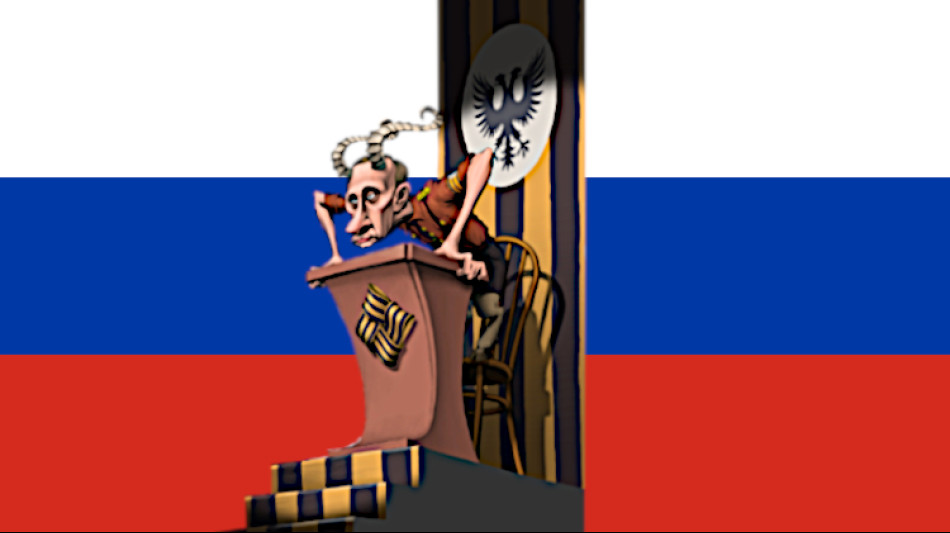
Israel politician threatens russian terror state on Russian TV

EU: No agreement on 10-year extension for glyphosate

Ukraine: When will the world stand up to Russian terror?

Warming: Methane levels rising, is this nature's answer?



